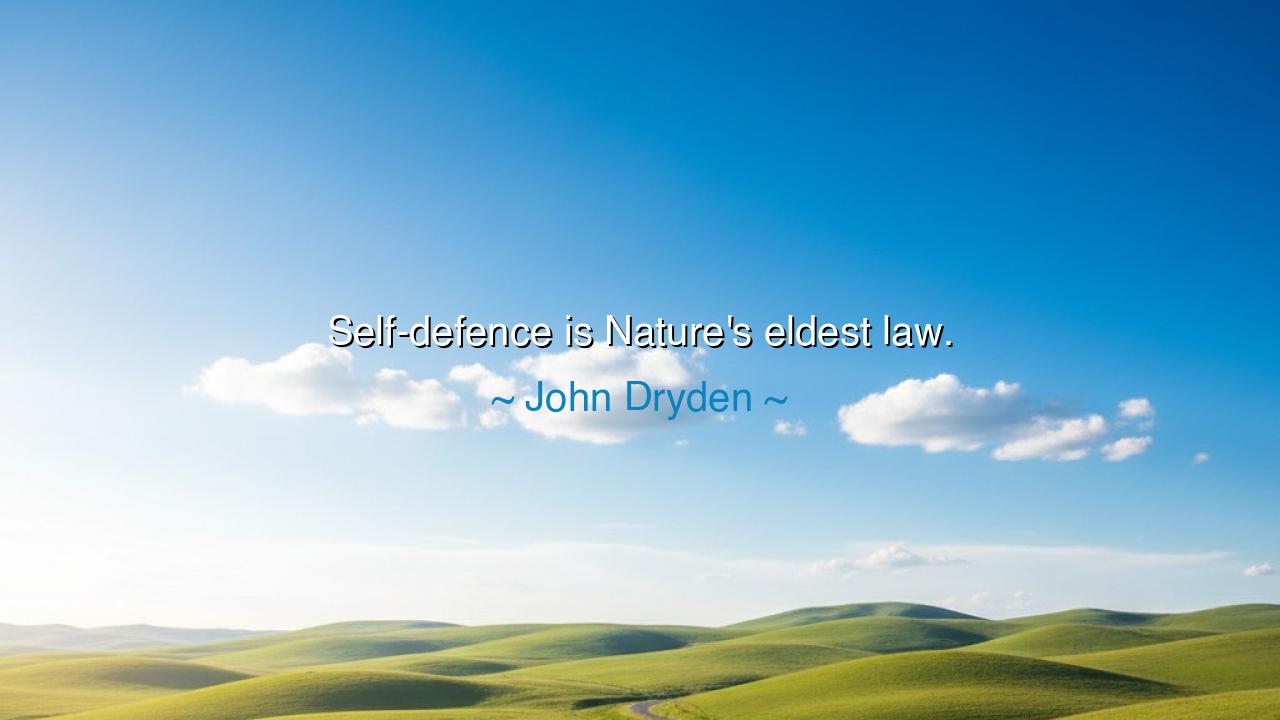
Self-defence is Nature's eldest law.






John Dryden, with the wisdom of one who gazed deeply into the nature of man and beast, proclaimed: “Self-defence is Nature's eldest law.” In this short but thunderous phrase, he reminds us of a truth more ancient than kings, older than empires, older even than the written word itself. It is the law not inscribed upon tablets of stone, but upon the very marrow of creation: that life, when threatened, must strive to preserve itself. From the smallest insect to the mightiest man, the instinct to defend one’s existence is the foundation upon which all other instincts rest.
The meaning of these words is clear: before law, before custom, before morality, there was the primal command — to survive. When faced with danger, when threatened by foe, beast, or famine, Nature herself whispers into the heart, “Defend yourself, or perish.” All other laws — of kings, of nations, of societies — are but later inventions, built upon this first and eternal command. For what good are laws of justice or beauty, if the very breath of life cannot be secured?
The origin of this principle is as old as creation itself. In the wilderness, the deer flees from the predator, the bird shields its young beneath its wings, and the warrior lifts his sword not from malice but from necessity. Dryden’s words echo the ancient recognition that self-defence is not aggression, but preservation. It is the right granted not by kings or parliaments, but by the hand of Nature, who gave claws to the lion, horns to the ox, and courage to the human heart.
History offers many vivid examples of this law at work. Consider the stand of Leonidas and his three hundred Spartans at Thermopylae. Their resistance against overwhelming odds was not conquest, but self-defence — a desperate stand to preserve their homeland and people from annihilation. Or recall Harriet Tubman, who, in leading slaves to freedom, often carried a pistol, both to ward off danger and to enforce courage in the face of fear. In both cases, self-defence was not cruelty but the highest form of duty — to protect life and liberty when threatened by destruction.
Yet there is also a moral lesson hidden in Dryden’s words. For if self-defence is Nature’s eldest law, then to deny a being the right to defend itself is to war against Nature itself. Tyrants who strip their people of the means to resist, oppressors who crush the weak into submission, are not merely unjust but unnatural, sowing seeds of rebellion that will one day rise against them. History has proven that when survival is threatened, the oppressed will find strength they did not know they had, for Nature herself commands it.
The lesson for future generations is this: honor the sacred instinct of self-preservation, but temper it with wisdom. Defend your body, your home, your family, and your freedom, for to do so is in harmony with the eternal order. Yet know also that self-defence is not the same as blind violence; it is a shield, not a sword of conquest. Use it when necessity calls, and let it serve as a guardian of peace, not a pretext for cruelty.
Practical actions follow naturally from this teaching. Strengthen the body so that it may endure trials. Train the mind so that in moments of danger it may not falter. Guard your loved ones, but also guard your principles, for the spirit too must be defended from corruption and despair. And above all, respect in others the same right you claim for yourself: the right to stand, to resist, to preserve their life and dignity.
Thus, John Dryden’s words resound through the ages: “Self-defence is Nature’s eldest law.” It is the first command of survival, the foundation of freedom, the birthright of every creature under heaven. To heed it is to honor the wisdom of Nature; to forget it is to invite ruin. Let this law be written not only in books but in the hearts of all, so that humanity may endure against every threat, standing as guardians of life, of liberty, and of the sacred gift of existence.






AAdministratorAdministrator
Welcome, honored guests. Please leave a comment, we will respond soon